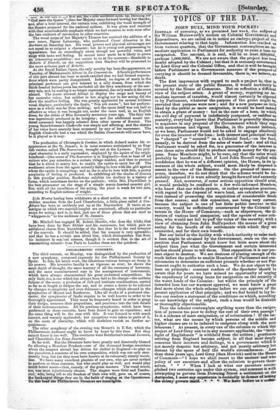PHILHARMONIC CONCERTS.
The third concert, on Monday, was distinguished by the production of a new symphony, composed expressly for the Philharmonic Society by Spohr. In this, his latest work, the illustrious veteran betrays no decay in his powers. His inventive faculty is as vigorous as ever; he shows the same depth of thought, the same mastery of all the resources of harmony, and the same unembarrassed ease in the management of instruments, which have always characterized his great orchestral compositions. Its only fault, too, is one which has always been laid to his charge—the uniform fulness of the score; a profusion of rich and intricate combinations, carried so far as at length to fatigue the ear, and to create a desire to be relieved by changes to simplicity and even thinness—changes which abound in the symphonies of Mozart and Beethoven. Like all works of a profound cha- racter, the symphonies of Spohr require to be well known in order to be thoroughly appreciated. They must be frequently heard in order to grasp their design, measure their proportions, and penetrate into the rich details of their instrumentation. All his previous symphonies, which have been performed at these concerts, have been found to gain on repetition; and the same thing will be the case with this. It was listened to with much interest, and warmly applauded; but exceptions were taken to parts of it, on the score of obscurity, which will doubtless vanish on further ac- quaintance.
The other symphony of the evening was Mozart's in E flat; which the Philharmonic audience ought to know by heart by this time. But they cannot know it too well. The overtures were Beethoven's colossal Leonora, and Cherubini's Les Deuz Joyrides.
So far well. But the Directors have been greatly and deservedly blamed for allowing a Monsieur Prudent—one of the thousand foreign musicians whom the tempest abroad has driven for shelter to England—to play on the pianoforte a concerto of his own composition, which was not only enor- mously long, but (as they must have known at its rehearsal) utterly worth- less. We have many excellent pianists of our own, who are never invited to perform at these concerts, but who could play as well, and would play much better music—that, namely, of the great masters. The vocal music, too, was most injudiciously chosen. The singers were Grisi and Tambn- rini ; who, being left to the freedom of their own will, gave us, of course, the hackneyed things they are in the habit of singing at the Operahouse. On this head the Philharmonic Directors are incorrigible.


























 Previous page
Previous page